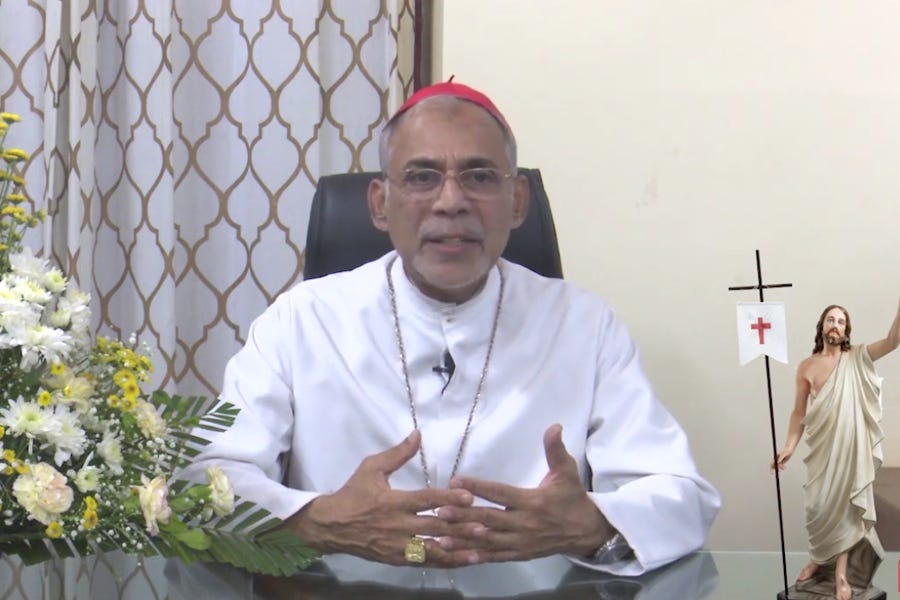
Happy first Friday of Lent friends,
And enjoy your day of penance. I mean that.
Penance is one of those things which, at least in the West, has become an almost uniquely Catholic concept. The idea of a day of penance, let alone marking a whole season of it, strikes our wider society as maudlin, weird, and full of “Catholic guilt.”
And while it is neither maudlin nor weird, guilt — especially in the context of Lent — is a good thing, something to be embraced.
We all have a lot to feel guilty about, I am sure. Not just in the superficial sense of “I was so bad when I did that,” but in the much fuller sense of living in the light of an informed and well-formed conscience which is, or should be, our internal impulse to convert, to reorient ourselves to God, and to embrace the better nature we are called to have.
Penance, with its works of prayer, fasting, and almsgiving, is uncomfortable, for sure. But it’s not meant to be miserable. Little actions, small offerings (or large ones) attune us to a right understanding of who we are, and who we need — God.
Modern social media psychobabble is full of talk about “mindfulness” and “being present,” which are themselves vacuous terms. To the extent they ever scratch the surface of human existence, they usually concentrate on “centering yourself in the here and now” to distract from the chasmous void at the heart of a human experience that knows not God, the unbearable weight of our imperfections without hope of redemption.
For us, Lent is the celebration of a great gift: the knowledge that our flaws, our jealousies, our petty vanity, and even what some might call our astonishing hubris, merit a great savior — one who is coming with power over the fear of death which rules and directs our baser natures.
Finding our place relative to that cosmic truth, and preparing to accept it, may not be a comfortable experience, but it can be joyful.
There is great joy to being a penitent when we are sure of His response, when each act of penance isn’t so much a plea for clemency before a wrathful master as a gesture of faith in the love of a Father whose nature we are striving to imitate.
In this sense, Lent is a time of relief, of rest, of remembering who we actually are, and for what purpose we were actually made — to know Him, love Him and serve Him in this world, and be happy with Him forever in the next, as we used to say.
I think the Meghan Markle crowd would call this “self-actualization,” or maybe “resting in your truth.” The Church calls it “conversion,” and it’s great.
The News
We had more information to report on the killing of Bishop David O’Connell of Los Angeles this week.
Carlos Medina of Torrance, California, was charged in Los Angeles Superior Court Feb. 22 with murdering O’Connell, with the aggravating allegation that he used a firearm in the killing.
Bail was initially set at $2 million and he faces a sentence of 35 years to life in prison if convicted.
The Los Angeles Sheriff’s Department has said that Medina has given several investigators several reasons for killing the bishop, but added that “none of them made sense to the investigators.”
Medina, the husband of O’Connell’s long-time housekeeper, has been arrested several times before for drug use, and is believed to have recently resumed a drug habit and been acting erratically in recent weeks. Medina’s lawyer, a public defender, is expected to request a mental health evaluation for his client, a process that could take up to two months to be completed.
You can stay up to date with the case here.
—
The case of Fr. Marko Rupnik, S.J., was back in the news this week, after the Society of Jesus announced it has launched an internal disciplinary process that could result in the priest being expelled from the society.
Rupnik was previously accused of horrific acts of spiritual and sexual abuse against multiple women religious, was convicted of crimes against the sacrament of penance and briefly excommunicated in 2019. Now, according to the Jesuits, he faces dozens of new accusations along the same lines.
The society also announced new restrictions on his ministry, including a prohibition on any public artistic work. While this is a new — and to Rupnik’s victims, no doubt welcome — restriction, his work remains ubiquitous in Church imagery.
What is interesting is that the society is pursuing an internal investigation and possible prosecution of Rupnik, who is apparently refusing to cooperate. And the society has made it clear it will use relevant canon law to expel him from the order if he’s found guilty.
Even more interestingly, by using norms pertaining to the internal ordering of religious communities, instead of the universal penal law of the code, the canonical statute of limitations does not apply — the Dicastery for the Doctrine of the Faith (DDF) had previously declined to waive this provision in allegations against Rupnik, and in an interview, Pope Francis said he was against waiving it in cases that didn’t involve minors, as a matter of general principle.
I’m not sure who came up with the new plan of pursuing Rupnik under canons 696 and 697, which doesn’t need Vatican involvement, though I would note that the chief prosecutor at the DDF is a Jesuit, a very experienced canonist, and would, at least to me, seem to have cause to be pretty frustrated at the decision not to waive the statute of limitations in Rupnik’s case.
Whoever it was, it’s good lawyering.
The Jesuits, especially the Superior General Fr. Arturo Sosa, have taken a lot of criticism in recent months for being less than forthcoming about the Rupnik situation — especially for allowing him to continue to function as an international ecclesial celebrity and religious art guru even after he was excommunicated for crimes against the sacrament.
That they are acting now, albeit under considerable public pressure to do so, is good. And it shows why public accountability journalism matters in the life of the Church. Read all about it.
📰
—
When registration opened for the 2024 Eucharistic Congress in Indianapolis, a lot of Catholic families were eager to sign up. But many of them were surprised at the price — $375 a ticket for individuals, and for families, $299 per adult plus $99 for each child over two.
Nine hundred bucks for a family of five (not including travel, room, and board) is a lot of money. While some registrants told us they could make it work, other likely attendees told us that cost had them thinking twice about whether they could afford to go.
On the other hand, the Eucharistic Congress is a big event, with catechesis, talks, liturgies, and break-out sessions (I never really know what those are) spread across five days. It’s got to cost something, and it all has to be paid for.
But is the price too high? How are congressional hopefuls reacting to the costs? And what are organizers, and parishes and dioceses doing to help would-be attendees make it work?
Well, we looked into all of that this week.
It’s definitely a balancing act for the congress’ team to get the price point right — to try covering costs while aiming to make attendance feasible. Read all about that balancing act here.
—
When the German bishops’ conference meets next week, its chairman, Bishop Georg Bätzing, will be canvassing for the group’s support for liturgical blessings for same-sex unions.
The same-sex blessing motion is due for its second reading at the synodal way assembly where, if it passed, would become an official resolution of the body. A majority of the bishops are already expected to back the motion — notwithstanding the Vatican’s unequivocal 2021 declaration that “the Church does not have, and cannot have, the power to bless unions of persons of the same sex.”
Bätzing’s whipping up of support is presumably to ensure near-unanimous support among the bishops to avoid a repeat of September’s synodal session, when the necessary two-thirds of the bishops failed to back a synodal proposal for a wholesale reform of the Church’s teaching on sexual ethics, triggering (if you’ll pardon the word) protests from the floor which involved a lot of hand holding and “self-care” among attendees.
Stay up to date with the synodal agenda here.
—
Earlier this week, Pope Francis granted a rescript to Pillar reader Cardinal Arthur Roche, as JD mentioned in his Tuesday newsletter.
For those of you who haven’t been following this story, Roche received the rescript — legally a special privilege, dispensation, or favor — granting him the authority to reserve the dispensation of some of the norms of Traditionis custodes.
It happened to be authority Roche previously insisted he already had, which would seem to militate against his needing a special papal rescript granting it to him, but that’s beside the point.
As a general rule, and I am simplifying here, the premise of universal ecclesiastical law is that Rome says “yes” or “no”, and it’s the bishop, having as he does the care of souls in his diocese, who gets to say “sometimes.” That appears to be changing.
More and more, the Holy See seems to be reserving discretionary authority to itself — even on matters like Traditionis custodes, which was supposedly promulgated in answer to the “wishes expressed” by bishops following a Vatican survey on the extraordinary form of the Mass.
It doesn’t make immediate sense to me why Traditionis would say it is meant as a helpful tool for bishops in their role “as moderator, promoter, and guardian of the whole liturgical life of the particular Church entrusted to him, to regulate the liturgical celebrations of his diocese,” but then decide they basically couldn’t be trusted to use it.
As I noted in the analysis, this apparent contradiction is of a piece with other recent canonical changes limiting bishops’ apostolic authority to govern their dioceses, all of which seem at odds with Pope Francis’ stated goal of putting the Roman curia “at the service” of bishops in the “spirit of sound decentralization” through his wider Vatican reforms.
More to the point, they seem to pull in the opposite direction of the central ecclesiology of the Second Vatican Council — sometimes, ironically, in the name of defending the council.
We’re seeing a real strain put on the essential link between the exercise of governance in the Church and pastoral care of souls, meant to be bound up together in the office of the diocesan bishop.
And it could end up leaving Pope Francis with a reforming legacy that looks like it was shaped more by the spirit of Vatican Council I than the texts of Vatican II.
You can read the whole analysis here.
What you call ‘football’
This is my first newsletter since returning to Washington after a month in London.
While I was over there, friends and family solicitously asked if I was going to be up all night watching the Super Bowl when it was on, and if I had a team I would be supporting in the match — yes, English people tend to call the Super Bowl a match, it sounds just as weird as calling the World Cup final a “game,” I assure you.
Such is the media hype for the Super Bowl that there was a lot of genuine curiosity around in London and, I think, a few people were hoping I would be their sporting Virgil, and lead them through the game’s mysteries, explaining as we went.
I had to disappoint them. Not being from either southern New Jersey or Kansas, I couldn’t claim a team loyalty for the big day. And the embarrassing truth is I couldn’t explain the rules of American football if you put a gun to my head. I’ve never actually watched a Super Bowl in my life — I did get invited to a Super Bowl party last year, but we ended up leaving before the game even started.
While the pageantry and fanfare of the NFL make for a very appealing spectacle, and part of me would love to be drawn into it all, if you don’t know what’s going on the games just look like a couple of dozen men in Kevlar lining up to butt heads like a bunch of rutting bighorns.
Maybe that’s all there is to it — there seems to be no shortage of hand-wringing pieces about the sport every year, warning about permanent injuries and talking about the whole thing being an excuse for violence and a thinly veiled version of gladiatorial combat for all involved.
If that’s the case, I would like to make a proposal which might answer everyone’s concerns:
It is a scientific fact that the more developed a sport’s rules become, the more unbearable the game is to play or watch — a phenomenon called “Manfred’s Law.”
“American football” is, so far as I can tell, rugby if it was regulated to the complexity of the American tax code.
“Rugby football” or “union football” split with “association football” (the one where you actually use your feet) in 1823 because of something William Webb Ellis did during a school match at Rugby. Both have, by comparison to the U.S. derivative, fairly easy rules to learn. And both are themselves descendants of an older form of the game, so-called “real football,” or “medieval football,” which is still played in a few places.
I bring all this up because probably the marquee match of the year is held, by tradition, on Shrove Tuesday in the English town of Atherstone — and this year’s game drew a crowd of thousands.
I say it drew a crowd of thousands, I should point out that there is no clear line between player and spectator and the gameplay is fairly simple: a largish ball is released into the crowd at 3 p.m., and whoever has possession of it when the game ends at 5 p.m. wins.
In real football, the other rules number exactly two:
1. The game must be played only along the town’s main drag, Long Street, along which all the shopfronts and other buildings are boarded up for the day.
2. You may not kill another player.
Those are all the rules.
As you might imagine, things get a little rowdy.
This year’s winners were a three-man team of local lads, Kieran Marshall, Lewis Cooper, and Scott Wright. Lewis had majority possession of the ball when time was called but shared the victory with his “punchers,” as he called them. All three are looking forward to defending their title next year.
It probably won’t surprise you to learn that the game triggers a wave of hyperventilating news stories about “brutal violence” and “carnage” each year. But it might surprise you to learn that everyone has a great time and hardly anyone gets injured, beyond bruises and a bloody nose.
So far as I can tell, the last person to suffer a serious injury was a match steward in 2020, who had a heart attack even though he wasn’t playing — and he kicked the game off this year.
The whole thing seems so much more healthy, and cheerful, than the weird sublimated violence of American football. I think we should just import it. It might even be a game the city of Philadelphia could actually win.
See you next week,
Ed. Condon
Editor
The Pillar




